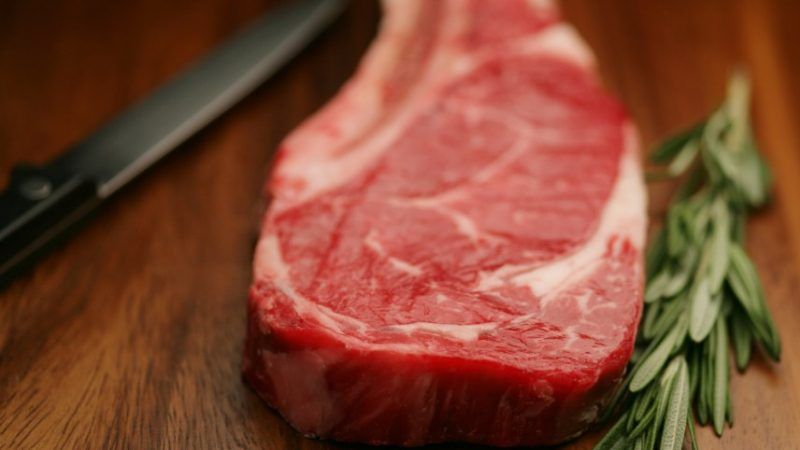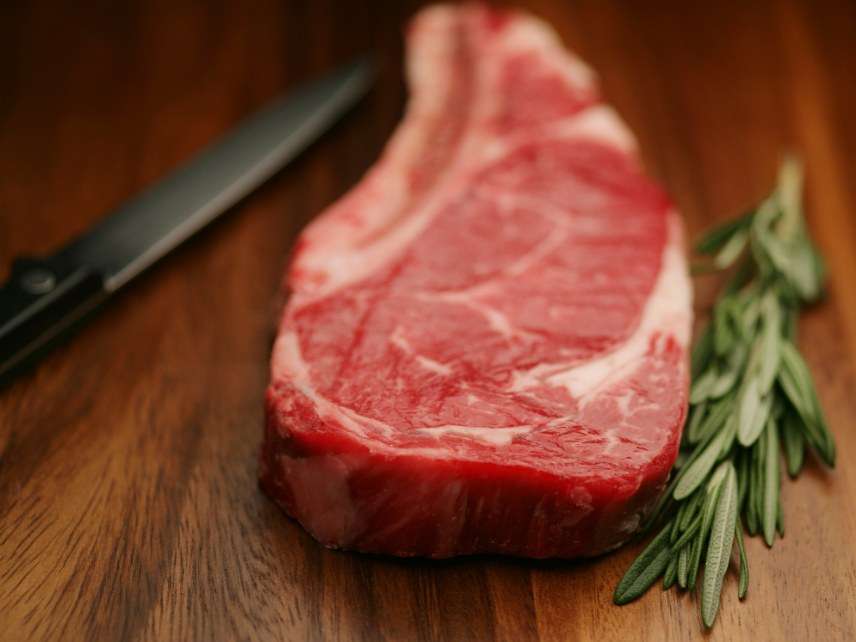PRIME Act Would Help Put the 'Local' Back in Local Meat Production
States could set their own rules for meat that's processed and sold within their own borders.


Locally raised meats might soon also be regularly slaughtered and sold locally, under a bipartisan bill now winding its way through Congress. The PRIME Act, first introduced two years ago, would allow each state to set its own rules for slaughtering cattle, pigs, and most other livestock and processing their meat, so long as that meat is sold only within the state's borders.
States have been prohibited from setting their own inspection rules since Congress passed the Wholesome Meat Act 50 years ago. Under current law, meat processed via "custom slaughter"—at independent slaughter facilities not subject to USDA rules—may not be sold commercially.
Consolidation in the wake of the law has resulted in fewer and fewer slaughter facilities, a problem I detail at length in my recent book, Biting the Hands that Feed Us: How Fewer, Smarter Laws Would Make Our Food System More Sustainable. That's meant fewer choices for small farmers and consumers alike.
The paucity of slaughter facilities in this country is truly startling. For example, a new USDA slaughter facility recently opened in Wyoming, making it the only such facility in a state that boasts 1.3 million head of cattle.
This lack of slaughter facilities at a time of rising demand for grassfed beef—typically produced by small farmers—is a huge problem.
The Wholesome Meat Act was intended to improve food safety. At a signing ceremony for the law, Pres. Lyndon Johnson said the bill would put "shady processors" out of business.
"[O]ne filthy plant is one too many," Johnson proclaimed. But neither the Wholesome Meat Act nor USDA inspection has been any sort of panacea.
For example, in a lengthy piece last month for the New Food Economy, I describe how the USDA's inspection regime is effectively broken. In the piece, I detail how a 2014 recall of nearly 9 million pounds of meat illustrates how a chain of USDA "actions were careless, secretive, and incompetent from the start, and likely played a role in the need for a recall."
Criticism of the Wholesome Meat Act is nothing new. In fact, opposition to the law was immediate.
"The new legislation provides for US government takeover if states do not meet US government set standards, whether based on sound public health reasoning or not," wrote Oscar Sussman, a New Jersey doctor of veterinary medicine, in a 1968 letter to the editors of the American Journal of Public Health, which had published an editorial in support of the new law. (emphasis in original)
"The new Wholesome Meat Act of 1967 sets an unwarranted precedent of federal takeover, under the guise of public health need, of functions normally required of state government," Sussman wrote. "The establishment of this precedent can and will lead to future unnecessary extension of big federal bureaucracies in other areas."
The unholy precedent of which Sussman speaks—not new at the time but, rather, traceable at least to the Supreme Court's wrongheaded decision in Wickard v. Filburn twenty-five years earlier—is Congress's delegation to the USDA of an authority Congress itself does not possess: the ability to regulate wholly intrastate commerce.
"It is hereby found that all articles and animals which are regulated under this Act are either in interstate or foreign commerce or substantially affect such commerce," the Act's findings declare. (Readers interested in what exactly "substantially affect" means might enjoy (or not) the three-part test discussed here.)
Two key PRIME Act sponsors told me this week why they've put their weight behind the bill.
"The PRIME Act will maintain high quality standards while easing burdens on producers, which means lower costs for consumers and greater opportunity to support local farmers," Senator Rand Paul (R-Kentucky) tells me.
"A lack of available processors is something I hear about from farmers in my District constantly," says Rep. Chellie Pingree (D-Maine). "The PRIME Act would change burdensome federal regulations to make it easier to process meat locally, which would help farmers scale up and give local consumers what they want."
But critics, particularly large producers, have been quick to pounce on the bill.
The National Pork Producers Council, which represents the nation's largest pork producers, is "vehemently opposed to the PRIME Act." The group says it opposes the bill in part because it could harm consumer confidence in the nation's food supply.
But many supporters, including small producers, are equally inclined to tout the consumer benefits of the bill.
There's no question in my mind that the federal government has the authority to regulate interstate commerce in meat (or anything else for that matter). I'm equally confident states possess plenary power to regulate commerce in meat within their own borders. Returning that power to the states would prove a boon to small farmers, grocers, restaurants, and consumers alike.


Show Comments (27)